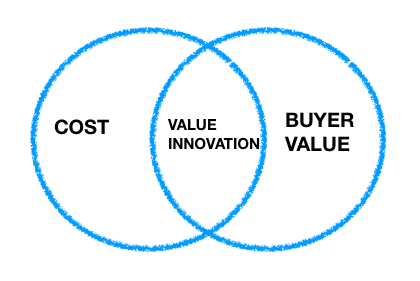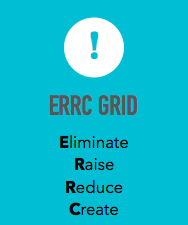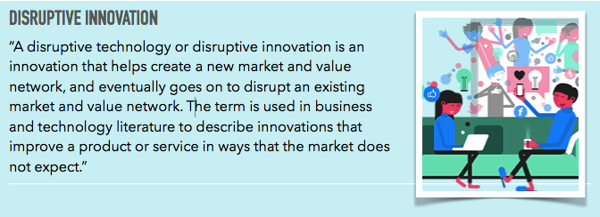Blue Ocean strategy in hotel industry
What is the Blue Ocean Strategy?
The main idea of the Blue Ocean Strategy is to find new markets and propose a value innovation. First of all, there must be a value-driven idea. It should be able to combine all operation models in order for the hotel to be the best in the market. Furthermore, this strategy is also targeting a cost cut. By eliminating several non-crucial services from the hotel life, it is possible to invest that saved money to other, more valuable factors like comfort or design. The Blue ocean strategy is focusing on people, who are seeking innovative ways to enjoy their stay at the hotel and are looking for different experience.

Blue Ocean Strategy
- Create uncontested markets
- Make competition irrelevant
- Create and capture new demand
- Break the value-cost trade-off
- Simultaneous pursuit strategy of differentiation and low cost
Red Ocean Strategy
- Compete in existing markets
- Beat the competition
- Exploit existing demand
- Make the value-cost trade-off
- Align strategy choice of differentiation or low cost
Based on Remarkable Crazy Ideas: The Blue Ocean Strategy for Hotels by Are Morch
Disruptive innovation is part of the Blue Ocean strategy. It is focusing on changing the way people think about certain basic processes or services. Same applies for accommodation providers. A hotelier might think that his hotel is very different and falls in the Blue Ocean but at the end of the day, it is still focusing on providing a room to the guest. Meaning, that it is focusing on the basic service or product of the hotel. Hotels, who are seeking to fall in the Blue Ocean, must take over the roles of teachers and educators. They need to spread the ideology they are working for. They need to educate people about their operating principles and show, how they are different and how this affects the local ecosystem. It is really challenging to be different, but some hotels in the world managed to move from the Red Ocean to the Blue one.
How does the Blue Ocean Strategy differ from the Red Ocean Strategy?
The Blue Ocean Strategy involves creating uncontested market spaces where competition is irrelevant. This is in contrast to the Red Ocean Strategy, which focuses on competing in existing markets. Key principles of the Blue Ocean Strategy include creating and capturing new demand, breaking the value-cost trade-off, and pursuing differentiation and low cost simultaneously. For hotels, this means offering unique value propositions that redefine the industry norms, such as providing innovative services or targeting previously untapped customer segments.
What are some practical steps that hoteliers can take to transition towards implementing the Blue Ocean Strategy?
Hoteliers can begin by identifying major problems their hotel solves and exploring alternative industries solving similar problems for potential partnership opportunities. They can also evaluate their readiness to shift towards emotional appeal, focusing on generating positive guest experiences rather than solely on price and functionality. Balancing sustainability and practicality with differentiation and innovation involves incorporating eco-friendly practices into operations while also investing in innovative services or amenities that set the hotel apart from competitors. This might include implementing energy-saving measures, sourcing local and sustainable products, or offering unique experiences that resonate with guests' desires for authenticity and personalizationHotels that succeeded with the Blue Ocean strategy
🏨 CitizenM Hotels. The main idea for this hotel chain was to provide 5* hotel service for 3* hotel price. They applied the so-called ERRC grid. Meaning that they eliminated some basic features, that can be found at most of the hotels: front desk, concierge, doormen, lobby, room service. Those are the services that we are used to seeing at most of the hotels. But hotels can successfully function without them as well. Instead of these services, which are appreciated not by every guest, they focused on raising sleeping quality and environment. That's something, that every single person is looking for when staying at the hotel. They also reduced the number of different room types by unifying them and transforming into comfortable and cozy smaller living spaces. New and cheaper innovations were introduced at the hotels. Such as check-in kiosk, communal living environment, pantry, and multi-tasking "ambassadors" (people, who can help with check-in give advice about the city or mix a cocktail).
3* hotel price. They applied the so-called ERRC grid. Meaning that they eliminated some basic features, that can be found at most of the hotels: front desk, concierge, doormen, lobby, room service. Those are the services that we are used to seeing at most of the hotels. But hotels can successfully function without them as well. Instead of these services, which are appreciated not by every guest, they focused on raising sleeping quality and environment. That's something, that every single person is looking for when staying at the hotel. They also reduced the number of different room types by unifying them and transforming into comfortable and cozy smaller living spaces. New and cheaper innovations were introduced at the hotels. Such as check-in kiosk, communal living environment, pantry, and multi-tasking "ambassadors" (people, who can help with check-in give advice about the city or mix a cocktail).
Michael Levie, Co-founder of CitizenM hotels, in his interview mentioned that "by default, hotels are in the Red Ocean because of the fierce competition. If you take your logo down and replace with the other brand's logo - nothing changes, apart from that logo".
🏨 Pixel hotel in Linz, Austria. This hotel instead of placing all rooms in one building, scattered ("pixelized") rooms along the city in various interesting and important locations. Without any doubt, guests will receive unforgettable value, depending on the room which they booked. Their goal is to "reactivate void spaces within the urban and rural fabric and to create connections between them". They can reach this by giving guests the direct experience of unusual accommodation with certain peculiarities is our aim. Rooms can be located in the tower, boat, gallery, communal kitchen, garden...
🏨 Grätzl Hotel in Vienna, Austria. This hotel is unique in its layout. Instead of going vertical like most of the hotels, this one spread rather horizontally. It joined all the buildings along the street and now can offer a real Vienna life feeling for its guests. Guests are located on the ground-floor and neighbouring small coffee shops, restaurants, market, bike rentals. In short, this creates a very special and unique ecosystem. The main concept is to save guests from cliché advertisings and touristy spots. Local businesses are always ready to provide insider tips for unseen tours and the best local places to have lunch.
Challenges of the Blue Ocean Strategy
One common challenge is resistance to change, as implementing the Blue Ocean Strategy often requires hotels to deviate from established norms and embrace unconventional practices. To overcome this, hotels can foster a culture of innovation and collaboration, encouraging employees to contribute creative ideas and solutions. Another challenge is identifying and targeting untapped market segments effectively. Hotels can address this by conducting thorough market research and leveraging data analytics to understand customer preferences and behaviour, allowing them to tailor their offerings to meet the needs of specific segments.
The Blue Ocean strategy is not that easy to achieve, but once you do, success and differentiation will be guaranteed. Hotels need to shift their focus from profit and more concentrate on sustainability and practicality. To successfully start moving towards a new ideology, hoteliers should ask themselves a few questions. For example: what major problems does your hotel tackle and solve? Are there any alternative industries that are solving the same problem? If yes - why not to partner up? Decide if you are ready to shift towards the emotional appeal. Meaning that you will be focusing on generating positive feelings for your guests. Rather than functional appeal where the main focus is on price and functionality.




